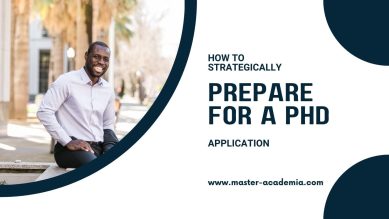
Some master’s degrees take one year, while others take two. Prospective students may find it difficult to decide which master’s programme is best for them. Learn more about the pros and cons of both one-year and two-year master’s degrees, so that you can make an informed decision.
Contents
- Key differences between one- and two-year master’s degrees
- Benefits of one-year master’s degrees
- Disadvantages of one-year master’s degrees
- Benefits of two-year master’s degrees
- Disadvantages of two-year master’s degrees
- Do I need a master’s degree to pursue a PhD?
- Can I do a PhD with a one-year master’s degree?
- Questions to ask yourself when choosing a master’s programme
Key differences between one- and two-year master’s degrees
Searching for the right master’s degree programme as a prospective student can be quite confusing. Why are there master’s degrees that last one year, while others last two?
Key differences between one-year and two-year master’s degrees are the length of study time, tuition fees, time to develop one’s expertise, and sometimes research-related training.
Starting with the length of study time, a two-year programme obviously takes longer than a one-year programme. What is important to know, however, is that the final certification is the same! There is no hierarchy, at least in theory, between one-year or two-year master’s degrees.
The length of a master’s degree is often correlated with tuition fees. One-year master’s degrees are often cheaper, simply because tuition fees have to be paid for a shorter period. There are of course always exceptions to the rule. Some one-year master’s programmes, especially executive programmes, can be very costly.
Both one-year and two-year master’s programmes can be very demanding. Yet, the latter offers more time to develop one’s expertise, research focus and networks. It is also easier to include a semester abroad or work placement in a two-year programme.
A common assumption is that one-year master’s degrees focus only on coursework, and do not include a thesis or dissertation. This is not true. There are plenty of one-year master’s degree programmes that include a thesis as well!
That said, many two-year master’s programmes are advertised as ‘research masters’. They often cover more methodology courses than one-year programmes and allow students to spend more time on thesis writing.
Benefits of one-year master’s degrees
One-year master’s degrees are short and intense. This can have several benefits, which draws many students to one-year programmes. Some of the key benefits are:
- Shorter time commitment. A one-year master’s programme degree offers the opportunity to earn an advanced degree within a limited amount of time. Depending on one’s circumstances, a one-year programme can be much easier to incorporate into one’s life instead of making a long-term commitment.
- Lower tuition fees. Lower costs for higher education in a one-year programme – compared to a two-year programme – can be an important advantage. This is especially true when studying in countries with higher tuition fees (like in the UK) compared to countries with lower or no tuition fees (like Belgium or Germany).
- Faster earning potential. Many students follow a master’s degree to increase their earning potential and to have better chances in the job market. Not everyone can afford to study for an extended period with limited earnings, and a one-year degree is more manageable in this respect.
- Easier to plan part-time. One-year programmes are attractive to students who want to study part-time while working on the side. A one-year programme usually lasts two years part-time, which is easier to commit to than a two-year programme stretched over four years!
Disadvantages of one-year master’s degrees
One-year master’s programmes have benefits and can be a very suitable choice for people. However, one-year master’s degrees are also some drawbacks. Some of the key disadvantages of one-year programmes are the following:
- It can feel rushed. One year is very short, and a lot of coursework plus a thesis are squeezed into less than 12 months, considering semester breaks etcetera. A one-year degree does not allow for much time to dive into the material or to explore several avenues in-depth before deciding on your specialisation. Time flies, especially in a one-year programme.
- It can be overwhelming. Not everyone is equipped or capable to complete a heavy one-year programme within the required timeframe. While this can also happen during a two-year degree, it is more common for students to extend their studies in a one-year master’s programme.
- Less methodological training. Depending on the specific programme, the methodological training may be limited to a one-year master’s degree. Therefore, it is important to define personal goals and objectives related to a master’s degree and consider carefully whether certain skills can be acquired in a one-year programme or not.
- Difficulty to incorporate internships or a semester abroad. One year can pass in the blink of an eye. During the summer months, many students of one-year master’s programmes focus on thesis writing. Therefore, the opportunities to get a work placement or an internship during the summer are limited. And incorporating a semester abroad is often not even an option in a programme that just lasts one year.
Benefits of two-year master’s degrees
Why would someone spend two years instead of one, to earn a master’s degree? There are several benefits of a two-year master’s degree. Some of the key advantages are:
- Using the first year for orientation, and the second year for specialisation. A two-year master’s degree provides more room to explore different subject areas before focusing and specialising on a specific topic, which will be covered in a thesis. A two-year programme helps those who are not certain about their specialisation yet.
- More time to develop and write a thesis. Many two-year master’s degrees incorporate a more elaborate thesis writing process. Often, it begins at the end of year one and stretches until the end of the programme. This can allow students to develop a more substantive piece of work.
- Ability to include studies abroad. A two-year master’s programme is more suitable for students who want to stay abroad as part of their studies. Many two-year programmes allow their students to study for one semester at a different university in a different country. International exposure is great for personal development and can have career advantages, too.
- More time to establish (academic and professional) networks. A two-year programme allows students to develop stronger ties with their professors and expand their networks. These can be academic networks (for instance through a stay abroad), or professional networks (through internships or work placements as part of the studies).
Disadvantages of two-year master’s degrees
Committing to a full-time study programme for two years also has its drawbacks. Some of the key disadvantages of two-year master’s degrees are the following:
- Longer time commitment. Despite spending double the time, the actual degree that will be conferred upon successful completion of a two-year master’s programme is in principle the same as a one-year master’s degree.
- Higher tuition fees. When studying longer, tuition fees – which are usually paid per semester or academic year – are also often higher than for studying just one year.
- Delayed earning potential. Studying for two years also (usually) means that students enter the labour market later. This has repercussions on someone’s earning potential, and not everyone can afford to be a student for an extensive period.
Do I need a master’s degree to pursue a PhD?
Whether you need a master’s degree to pursue a PhD is depending on where you want to do a PhD. There are, for instance, differences in degree requirements in the U.S. and Europe.
Master’s degrees exist in both North America and Europe. However, in Europe, a master’s degree is generally required to do a PhD. In the U.S., it is mostly possible to pursue a PhD after completing a 4-year bachelor’s degree.
Can I do a PhD with a one-year master’s degree?
Another question that prospective master’s students may have is whether they next can you do a PhD with a one-year master’s degree. The short answer is: Yes, you can do a PhD with a one-year master’s.
If you strive for an academic career, or you just want to keep your options open, a one-year master’s degree is generally accepted as an entry requirement for a PhD in Europe.
That said, some PhD programmes require a certain amount of methodology courses and training. This is very university-specific. Some universities may require prospective PhD students to follow some preparatory methodology courses before starting their PhD if they were not sufficiently covered during the master’s degree.
Therefore, if you want to pursue an academic career, make sure to explore the specific requirements of your target universities well in advance.
Questions to ask yourself when choosing a master’s programme
With so much information on one- or two-year master’s programmes, how do you make a decision that is right for you? The following questions can help you to decide what master’s degree is right for you:
- Why do I want to do my master’s? What are my objectives?
- How expensive are the programmes and how can I finance my master’s?
- Do I want to explore a new topic or discipline more widely, or do I already know what I want my specialisation to be?
- Do I want to work next to studying, do an internship, or include a semester abroad?
- What (research) skills do I want to acquire and to what extent are these skills covered by the programmes that interest me?



